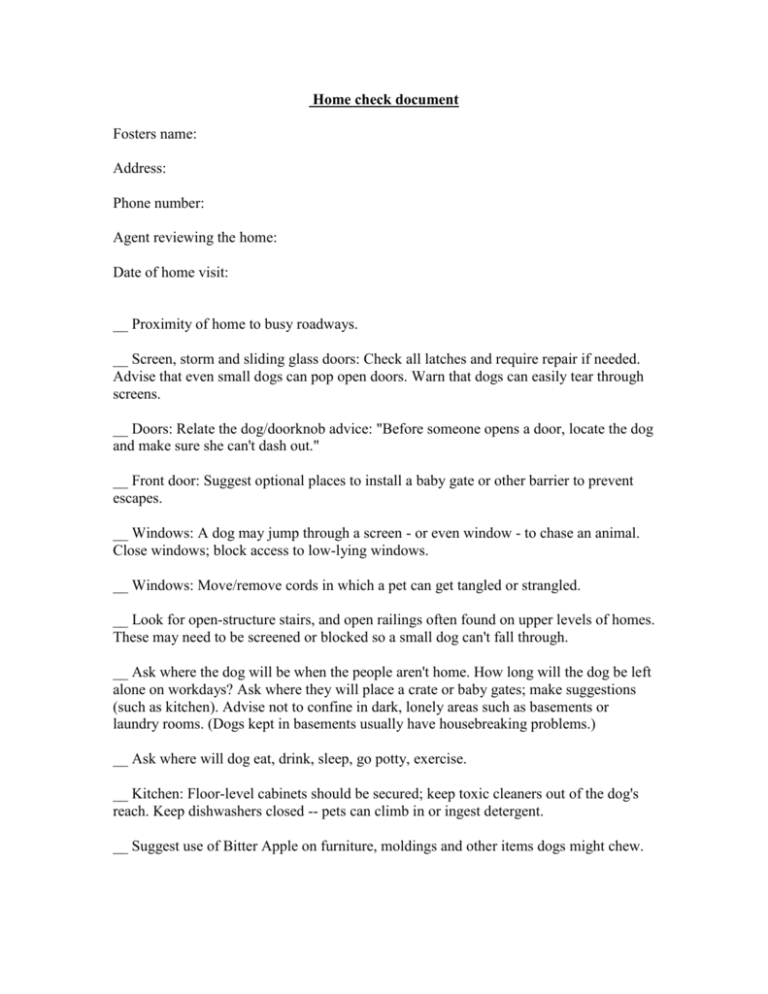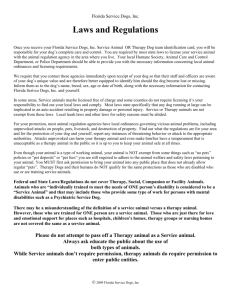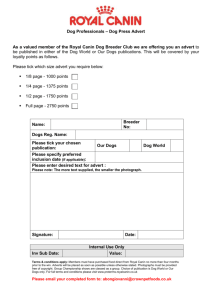Home Check - From Forgotten to Forever
advertisement

Home check document Fosters name: Address: Phone number: Agent reviewing the home: Date of home visit: __ Proximity of home to busy roadways. __ Screen, storm and sliding glass doors: Check all latches and require repair if needed. Advise that even small dogs can pop open doors. Warn that dogs can easily tear through screens. __ Doors: Relate the dog/doorknob advice: "Before someone opens a door, locate the dog and make sure she can't dash out." __ Front door: Suggest optional places to install a baby gate or other barrier to prevent escapes. __ Windows: A dog may jump through a screen - or even window - to chase an animal. Close windows; block access to low-lying windows. __ Windows: Move/remove cords in which a pet can get tangled or strangled. __ Look for open-structure stairs, and open railings often found on upper levels of homes. These may need to be screened or blocked so a small dog can't fall through. __ Ask where the dog will be when the people aren't home. How long will the dog be left alone on workdays? Ask where they will place a crate or baby gates; make suggestions (such as kitchen). Advise not to confine in dark, lonely areas such as basements or laundry rooms. (Dogs kept in basements usually have housebreaking problems.) __ Ask where will dog eat, drink, sleep, go potty, exercise. __ Kitchen: Floor-level cabinets should be secured; keep toxic cleaners out of the dog's reach. Keep dishwashers closed -- pets can climb in or ingest detergent. __ Suggest use of Bitter Apple on furniture, moldings and other items dogs might chew. __ Bathrooms: Don't confine there. Dogs have been injured slipping off tubs or turning on faucets. __ Look for cords/wires on which dogs might chew and get electrocuted. Conceal or unplug. __ Space heaters and electric appliances: Remove from floor. __ Power strips: Cover open outlet holes so pets can't stick claws or tongues in them. __ Valuables: A dog may knock over items, or may seek to chew your knick-knacks. Move them to higher ground. Remove glass, ornaments and window candles that a dog may knock over. __ Bathmats and scatter rugs: Dogs may chew on them. __ If they have other pets: Do they look healthy? Observe water bowls, toys, bedding. How clean is the kitty litter box, dog crate or bird cage? Is the litter box and cat food out of the dog's reach? __ Doggie doors: Advise to block them when the dog is left alone in house. Never leave dogs outside when you're not home for safety and liability reasons. __ Balconies and decks: For small dogs, require the applicant to install chicken-fencing or other barriers to prevent the dog from slipping through. Reinspect before adoption. Most areas have laws against leaving pets unattended on balconies/decks. __ Basements: Check for hazards -- tools, cords, items a dog can get hurt on. Block access to sump-pumps, furnaces, appliances. __ Garages, workshops, sheds: Tell people not to allow dogs in these areas, where they can get hurt or die from exposure to tools, loose nails, poisons -- and antifreeze. Pets love the taste of antifreeze, but one lick can kill a dog. __ Fence gates: Repair latches that a dog or a passerby can knock open. __ Fences: Walk every foot. Look for loose boards and gaps, which must be fixed and reinspected before adoption. Before the visit, find out any fence requirements for the particular dog. __ Fence advice: Adopters should watch a dog when in the yard for safety and liability reasons. __ If there's a gap under a fence, a dog can quickly dig his way out. Block escape routes, pile up sod, or construct a sunken barrier at the fenceline (bricks work well). __ Chain-link fences: Warn that many dogs can learn to climb over them. __ Picket fences: If the boards face out, many dogs can push them out. Have the applicant reinforce as needed for the particular dog with extra nails and cross-beams. __ Gaps: Dogs can push through gaps. Advise applicant to line the fence interior with chicken wire. Require fixing and re-inspect before adoption. __ A/C and electrical units: Shield wires to prevent dogs from getting electrocuted. __ Window wells: Cover them so dogs don't fall in. __ Pools: To prevent drowning, the adopter will need to keep the pool securely fenced off and/or covered with a sturdy pool cover when not in use. Also, there must be graded steps out of the pool, not just a ladder. Adopters should carefully train the dog how to get out __ Before approving a HC, ask yourself if you would entrust your dog to these people. Notes from home check inspector: Anything else we should know? ____________________________ ________________________ Foster signature Home inspector signature ________________________ ________________________ Date Date





